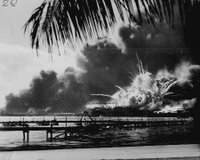Pearl Harbor

No other event of historical significance that has occurred in my lifetime has etched itself in my memory like the day the Japanese attacked Pearl Harbor. I’ll never have to look up the date - December 7, 1941. I remember exactly what I was doing when the news came over the radio. I remember President Roosevelt’s speech the next day in which he called December 7, 1941 the "date that would live in infamy."
We were just finishing supper around the kitchen table on that Sunday evening. Dad had retired to his favorite spot in the living room and turned on the new radio. As soon as he heard what was happening, he called out, "Come in here and listen to this!" Many men were killed. Many ships had been sunk in that Hawaiian harbor. We were at war with Japan. At eight years old, I didn’t know what that meant, but it surely didn’t sound good.
In the days to come life changed. Fathers of my friends at school were drafted into the army. Other men were joining the navy and marines to avoid the draft. My Dad was too old for any of that - he was 52 - and he still had that crippled foot that had kept him out of the first World War. Shipbuilding became a major source of employment in Tampa, and men who had been out of work now had no problem finding a job. My Uncle Wade moved to Tampa to work in the shipyards and lived with us for awhile. The newspapers were full of the call to arms. Patriotism was at a high level.
The first real effect the war had on our family was the rationing of food and gasoline. Every household had a "Victory" garden. We grew corn, tomatoes, potatoes, okra, radishes, and squash, and our chickens with their eggs became more valuable. Some of our neighbors were even frying squash blooms for dinner.
Dad could barely get enough gasoline to get to and from work. It was impossible to buy new tires for the car and retreads were hard to find, so driving for pleasure was really limited. Mom bought an old used bicycle and learned to ride it for the first time so she could get to the grocery store. She liked to say that I taught her how to ride. She really taught herself, but I did run along beside her when she was practicing and tried to keep her from falling. As she improved, I’d ride my bike beside her around and around the block until she got it mastered.
War bonds were sold to finance the war effort. $25 bonds were sold for $18.75 that were to mature in 10 years at face value. At school we were encouraged to buy 25 cent savings stamps to paste in a book. Sometimes I’d skip lunch and use the quarter for a stamp. When the book was filled, it could be exchanged at the bank for a $25 bond.
There were "victory" scrap drives. We had a scrap pile in our yard. Neighbors would bring all sorts of old metal things and throw them onto the pile. An army truck came by periodically to pick up the stuff, and it went to reclamation depots where it was melted down to become war material. One thing was thrown on the scrap heap that I wanted to keep - a bugle - but Mom wouldn’t hear to it.
The automobile companies suspended the manufacture of new cars, devoting their plant capacity to building war machines - tanks and trucks, etc. They didn’t start making cars again until 1946.
My friends and I had endless debates on which branch of the service we’d prefer if the war was still on when we got old enough. I didn’t want any part of the army or navy. My preference was the air corps. Airplanes appeared in the sky for the first time, and that looked exciting. Tampa was the home of two air bases - MacDill and Drew Fields. It was the Army Air Corps back then - not the Air Force. Drew Field later became Tampa International Airport, and MacDill Field became MacDill Air Force Base and is still there.
Soldiers and sailors appeared on the streets in uniform, and were instant heroes to the kids. Some came to Dad’s church, and he’d bring one or two home every week for Sunday dinner. That began some lasting friendships. They were from all over the country. I remember Nicky from Brooklyn, New York, Oscar from Pennsylvania, and Carl from Peoria, Illinois. Carl Woerner moved with his wife to Tampa after the war was over and remained friends.
It was a long four years, but it was not all unpleasant. Everyone in the neighborhood was in the same boat, so to speak, and there was a lot of sharing. When Oscar was shipped out, he sold Dad his car - a 1937 Lincoln Zephyr, and for the first time we had a car that was comfortable to ride in. It was a quiet and smooth with a 12 cylinder engine. That was the car I later learned to drive in.

Ann and I visited Pearl Harbor a few years ago, taking a boat out to the memorial that marks the spot where the USS Arizona sank. The memorial lists the names of all the sailors that died on the Arizona that fateful day. It’s a somber place. Very few of the bodies were ever recovered. Oil is still leaking out of the fuel tank and bubbling up, making a circular rainbow on the surface of the water as each drop arrives.

0 Comments:
Post a Comment
<< Home